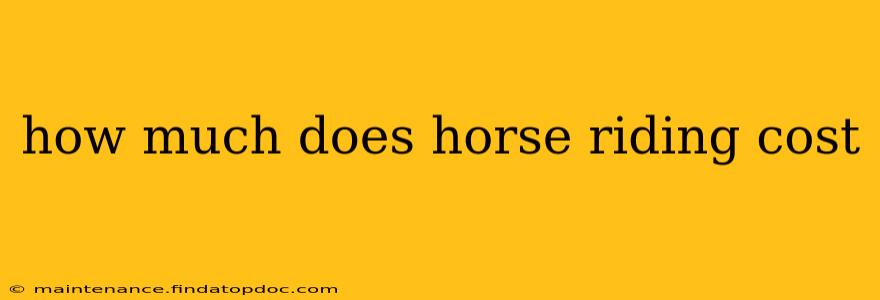How Much Does Horse Riding Cost? A Comprehensive Guide
The cost of horse riding varies dramatically depending on several factors. It's not a simple answer, and understanding the nuances is crucial before you saddle up. This guide breaks down the expenses involved, helping you budget effectively for your equestrian journey.
What are the Different Costs Associated with Horse Riding?
The overall expense depends on whether you own a horse or utilize services offered by a riding school or stable.
Option 1: Riding Lessons at a Stable/Riding School: This is generally the most accessible and affordable entry point.
- Lesson Fees: This is your primary cost. Prices vary widely based on location, instructor experience, lesson duration (30 minutes, 45 minutes, or an hour), and the type of lesson (beginner, intermediate, advanced, specialized disciplines). Expect to pay anywhere from $30 to $100 per lesson. Group lessons are usually cheaper than private ones.
- Additional Fees: Some stables may charge extra for things like helmet rental (if you don't own one), arena use fees, or seasonal surcharges.
Option 2: Owning a Horse: This is significantly more expensive and involves ongoing commitment.
- Purchase Price: The cost of purchasing a horse varies immensely based on breed, age, training level, and bloodlines. Prices can range from a few thousand dollars for a less-desirable horse to tens or even hundreds of thousands of dollars for a highly trained or pedigreed animal.
- Boarding: Boarding fees are a substantial ongoing expense. Full board (includes stall, hay, grain, and general care) typically costs between $500 and $1500+ per month, depending on your location and the level of care provided. Partial board options, where you provide some of the care, can be slightly cheaper.
- Veterinary Care: Regular checkups, vaccinations, and unexpected illnesses or injuries can add up quickly. Budget for several hundred dollars annually for routine care, with potential for significantly higher costs in case of emergencies.
- Farrier: Horses need their hooves trimmed and shod regularly. Expect to pay between $50 and $100 per visit, every 4-6 weeks.
- Equine Dentist: Horses need their teeth floated (filed down) periodically. This is typically an annual cost.
- Feed and Supplements: High-quality feed is essential. Costs will depend on the horse's size, workload, and dietary needs. Expect to spend several hundred dollars per month.
- Tack and Equipment: You'll need a saddle, bridle, and other riding equipment. The initial investment can range from a few hundred to several thousand dollars, depending on quality. You'll also need to replace items as they wear out.
- Transportation: Getting your horse to and from the vet, farrier, and shows (if applicable) involves transportation costs, be it trailering or other means.
- Insurance: Equine insurance can help cover unexpected veterinary bills.
How Much Does It Cost to Board a Horse?
As mentioned above, boarding costs are a major expense for horse owners. The price range of $500-$1500+ per month is a broad estimate. Several factors influence this cost:
- Location: Boarding facilities in urban or high-demand areas tend to be more expensive.
- Level of Care: Full-service boarding includes stall cleaning, feeding, and pasture management, while partial board requires owner involvement.
- Amenities: Facilities with riding arenas, round pens, and other amenities often charge more.
- Type of Boarding: Pasture boarding, where horses live primarily in pastures, is generally cheaper than stall boarding.
What are the Hidden Costs of Horse Ownership?
Beyond the obvious expenses, several hidden costs can easily add up:
- Unexpected Veterinary Bills: Accidents and illnesses happen. Be prepared for significant expenses.
- Equipment Repairs and Replacements: Saddles, bridles, and other gear need maintenance and eventual replacement.
- Competition Fees (if applicable): Show entry fees, travel, and stall rentals can add to the overall cost.
- Training: Professional training for your horse can be expensive.
How Can I Reduce the Cost of Horse Riding?
- Group Lessons: Group lessons are generally cheaper than private instruction.
- Lease a Horse: Instead of buying, consider leasing a horse to share the costs.
- Volunteer at a Stable: You might gain riding time in exchange for assistance.
- Buy Used Equipment: Purchase used saddles and other equipment to save money.
- Careful Budgeting: Create a realistic budget that accounts for all potential expenses.
Ultimately, the cost of horse riding is a significant commitment, whether you're taking lessons or owning a horse. Thorough research and careful planning are crucial to ensure a financially sound and enjoyable experience.
